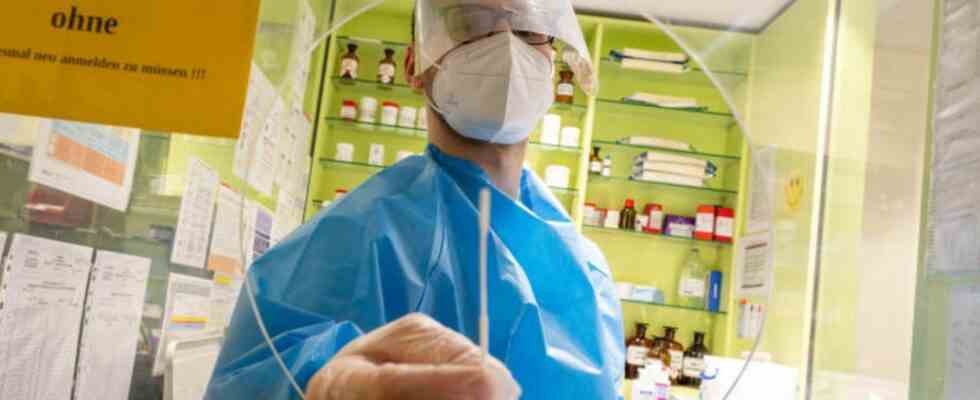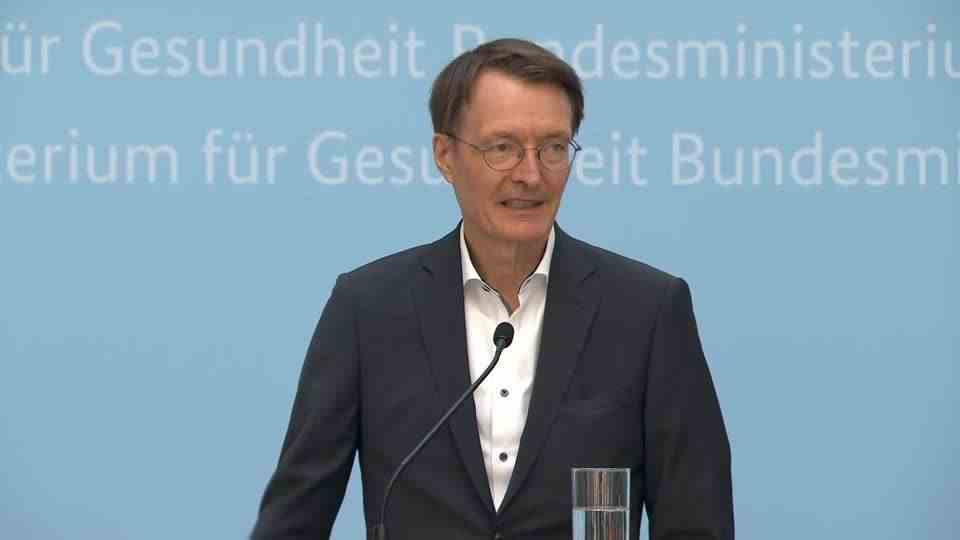New test regulation
evidence required. Enter in lists. On-site payment – this is how complicated the corona citizen tests will be in the future
Ready for the smear: A pharmacy employee holds a corona test stick through the opening of a pane.
© Peter Kneffel / DPA
Health Minister Karl Lauterbach has revealed how the corona citizen tests should work in the future. Here’s a hint: It won’t be easy!
Anyone who has a rapid corona test carried out in a test center usually has to pay three euros for it from July. This is what the new test regulation provides for, which Federal Minister of Health Karl Lauterbach (SPD) presented on Friday in Berlin. The citizen tests should only remain free for small children, particularly vulnerable groups and when visiting care facilities and hospitals. Trade unionists and patient representatives reacted with criticism.
Lauterbach justified the change with the high costs for the federal budget, which are currently around one billion euros per month. “Unfortunately, we cannot afford that in the tight budget situation that awaits us in autumn,” said the minister, who accordingly agreed on the new regulation with Federal Finance Minister Christian Lindner (FDP). According to Lauterbach, the costs for the federal government through the citizen tests by the end of the year are now estimated at 2.7 billion euros. Without the change, it would have been five billion euros.
The new test regulation at a glance:
Free Tests: Lauterbach explained that free quick tests should continue to be possible for vulnerable groups. These include children up to five years of age, women at the beginning of pregnancy, visitors to clinics and nursing homes, members of the household of infected people, residents of facilities for people with disabilities and people who cannot be vaccinated. Provision should be made for submitting proof that you are entitled – for example by means of an ID card or passport, with certificates, forms or certificates.
Three euro tests: With an additional payment of three euros, tests should therefore be available in other cases. For example, before going to a concert indoors, before larger family celebrations or visiting older people, after risky contacts, if there is a warning on the Corona app. For these subsidized tests, too, you should put your name on a list at the test center and justify the reason for the test.
The payment: Citizens can pay the three euros in the test center or pharmacy in cash or by card as usual. For providers, the “reimbursement price” is to be reduced from 11.50 euros to 9.50 euros: in addition to the three euros, 6.50 euros come from the federal government. The federal states have the option of taking on the citizen’s share of the tests, said Lauterbach. This is also a way of reacting to larger corona outbreaks, for example. SPD parliamentary group leader Dagmar Schmidt said: “I would be very happy if the federal states would contribute to the costs and thus enable free citizen tests.”
Corona search: “We want to continue to break chains of infection with the citizen tests in the future,” said Lauterbach. The new concept is well prepared for this. This means that the network of test centers will now also be maintained. It is to be expected that the number of citizen tests will decrease. However, tests without a reason would not be recommended either.
controls: The new concept should also react to various cases of billing fraud with the lucrative tests. Among other things, the control frequency should be increased, as Lauterbach said – for example to detect test centers that almost only charge negative tests more quickly.
Criticism at the end of the free tests
DGB board member Anja Piel called on the states to act. “Infection protection must not depend on the wallet. The federal states must assume their responsibility here and accept the three euros,” she explained in Berlin. Even if vulnerable groups are exempt from the obligation to pay, people with low incomes would be additionally burdened by the new regulation.
Bavaria’s Health Minister Klaus Holetschek (CSU) did not comment on a possible assumption of costs in an initial statement. However, he called for caring relatives to be able to take free tests. “It cannot be that a caring relative should pay three euros when it relieves the old people’s and nursing homes,” explained Holetschek in Munich.
The board member of the German Foundation for Patient Protection, Eugen Brysch, also referred to those in need of care living at home and their relatives. Excluding them from free trials “is a grave mistake,” he warned. “The heads of government of the countries are required to reverse the mistake by covering the costs for these particularly vulnerable people.”



